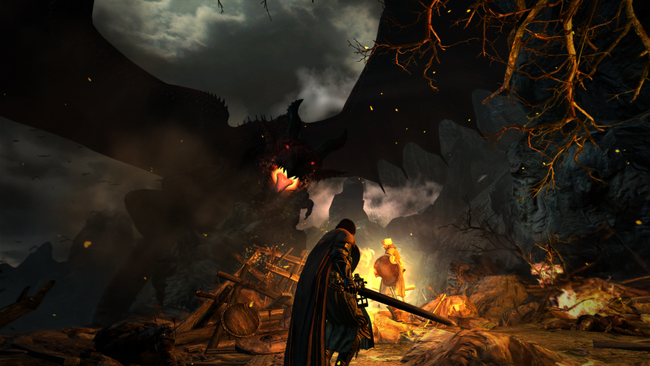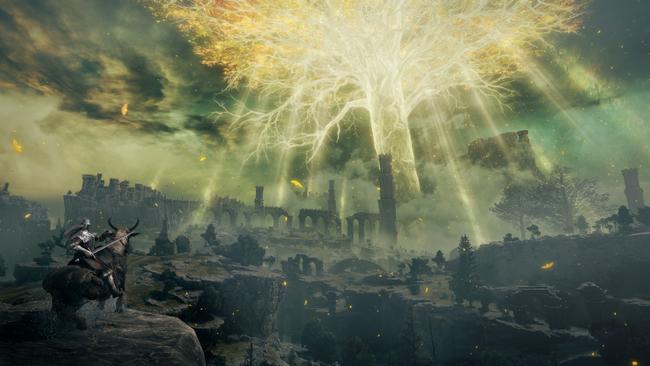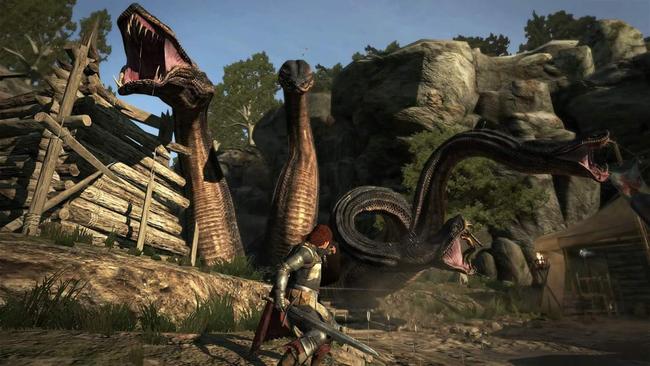
One painful Elden Ring side effect - I can’t stop thinking about Dragon’s Dogma 2
You don’t need me to tell you this again, but Elden Ring is excellent. Bryan concluded that in our review, and the internet is now ablaze with a mix of Souls veterans and complete newcomers to this type of game all bathing equally in its sheer brilliance.
Despite all of the praise, Elden Ring isn’t perfect. It’s wonderful, and clever, but it has lots of little wrinkles in it that are sometimes frustrating. And yet… that’s almost part of its charm? This term is used too often, but every now and then a game comes along that is truly more than the sum of its parts, where the things it excels at make all of the shortcomings simply evaporate. Elden Ring is one of those games; and it’s got me thinking about another. Dragon’s Dogma.
I mean, honestly, a little part of my brain is always thinking about Dragon’s Dogma. Capcom’s 2012 open-worldish action RPG was a deeply flawed masterwork, then improved immeasurably by a 2013 expansion and re-release. I always felt it never quite got a fair shake on release, though re-releases on modern hardware between 2016 and 2019 seemed to help the game gain the cult status it always deserved.

In many ways, the ebb and flow of Elden Ring reminds me of that game - if not in direct comparison, then in the broad terms of what the developers were aiming for. Both games are storied Japanese creators taking aim at genre conventions honed and polished in Western games, adding a distinctly Japanese twist that gives them a unique flavor, all while presenting an artistic vision and world that feels distinctly non-traditional for RPGs designed in Japan.
In a weird, round-about way, I sort of think of these games as cousins, even though Elden Ring has a complete family tree in the other ‘Soulsborne’ games and was likely developed without the words ‘Dragon’s Dogma’ ever being uttered in FromSoftware’s offices. More than anything, these two games evoke the same feeling in me.
That connection means it feels natural, at least to me, that my Elden Ring dominated thoughts have slowly begun to embrace a bedfellow: daydreaming of Dragon’s Dogma 2.
Specifically, it triggered a thought process about how much time has passed since Dragon’s Dogma was designed, and in turn how much the design of open-worldish action RPGs has changed. There's been a serious evolution over the last decade.
When Dragon’s Dogma was released, Skyrim was only a few months old. There’d been no Witcher 3, no GTA5 or Red Dead Redemption 2. It predates Final Fantasy having a crack at an open world, and Assassin’s Creed’s transformation into an open-ended, choice-driven action RPG series. While Demon’s Souls was out then, it was still a novelty cult hit; Dark Souls was only just beginning to assert itself as a true contender. Basically, a lot has changed since.
Perhaps most notably, Capcom hadn't had a taste of enormous worldwide action RPG success, as it later had with Monster Hunter World - another game that a Dragon's Dogma sequel could learn much from.

And yet, probably the most impressive thing about Dragon’s Dogma is how much of its design has endured despite the genre moving forwards. So much of that game is still compelling, which is why Capcom was able to garner much success by re-releasing the game with slight improvements to the visuals and performance. It didn’t feel aged, even when playing it after Witcher 3 and its kin - which is proof that director Hideaki Itsuno really was onto something with that game.
As I go into some of Elden Ring’s biggest battles against enormous beasts, the Soulsborne tradition of insurmountable odds against huge foes coes to mind. When I call forth one of the Legendary Ashes Summons with the Spirit Calling Bell and they charge into battle ahead of me, Dragon’s Dogma’s AI pawn companions naturally come to mind. I imagine how some of these systems might take shape in a modern iteration, and how games like The Witcher 3 and Elden Ring might influence their design. And, yes, god, it’s exciting. I want it. I need it.
For Capcom’s part, it seems the time has never been better. The time, genuinely, could be upon us. Hideaki Itsuno finished his work on Devil May 5 in 2019, and has since been working on an unspecified, unannounced project. In 2019, Itsuno told me he’d been given the choice between working on DMC5 and Dragon’s Dogma 2, but chose to make DMC5.

“Here we are - we're now finishing up DMC5. But I had ideas for Dragon's Dogma 2 at the time as well. So here we are, it's the end of this project,” Itsuno explained to me in an interview at a DMC5 launch event - and I could swear there was a telling twinkle in his eye. He also noted that Dragon’s Dogma was the project he was most proud of, though DMC5 was more effort and harder work.
“I'm already gearing up for my next project. We can't say what it is, but we're looking forward to getting to work on it.”
The time feels right. And Elden Ring is absolute proof that the desire for games like this is there. I want a Dragon’s Dogma 2 that learns from the success of FromSoftware’s action RPGs, and examines the tropes and design conventions of modern Western RPGs in the same way the original did of those of the noughties.
So, yeah. Elden Ring has me asking it yet again. When’s Dragon’s Dogma 2? My hope that the answer is “soon” has never, ever been higher.